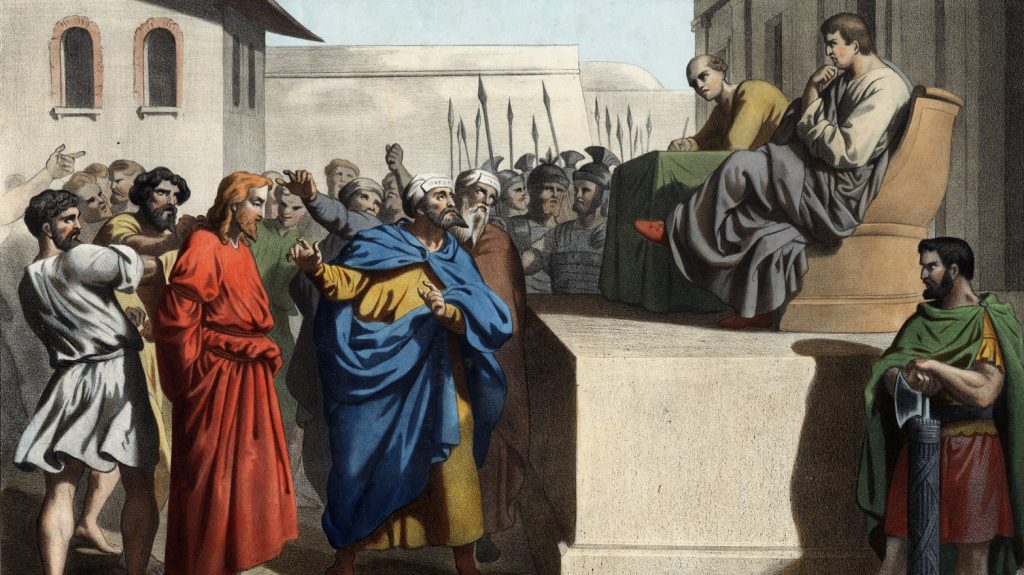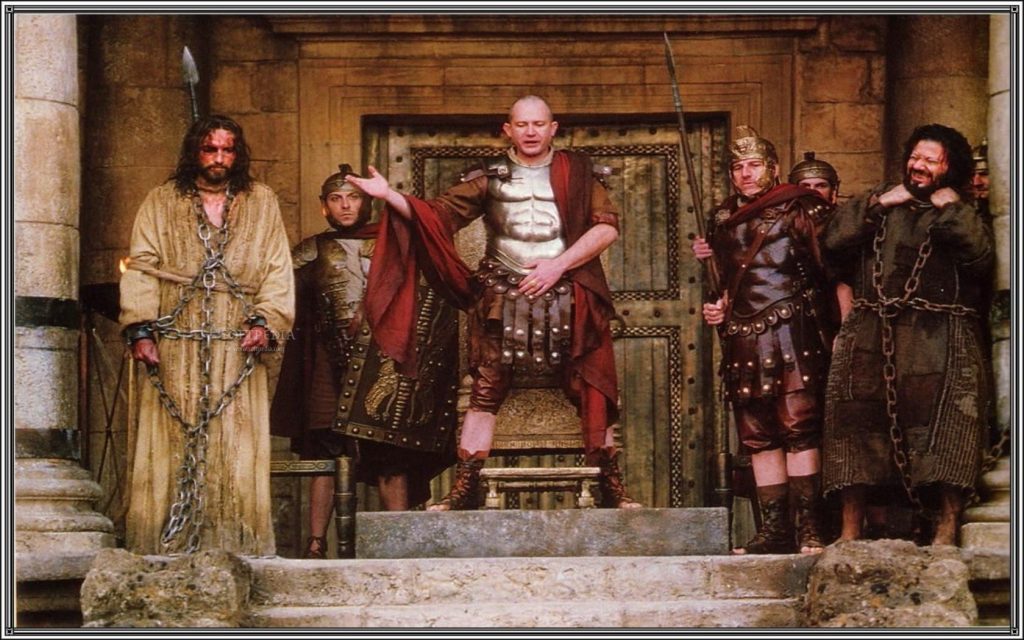The stakes were high in Jerusalem as Jesus was making his way unto the cross. In Luke Chapter 23, we get a look at the trial of Jesus Christ before Pontius Pilate, his meeting with King Herod Antipas, his crucifixion, death, and burial. The story is well recorded and well covered in history because it details Jesus’ atoning death for our sins on the cross. However, in that chapter, there is a little incongruence that I want us to look at through narrative analysis. It is shocking, and when we consider it deeply, it may help us understand a thing or two about this generation’s #CancelCulture.
The Jews had no authority to administer the death penalty, so they went to Pilate, who was the Roman governor over the region of Judea. They brought Jesus to Pilate hoping for a favourable result. Secular history shows us that Pilate was a cruel, ruthless man, completely insensitive to the moral feelings of others. Surely, they thought, Pilate will put this Jesus to death. Surely he would put an end to all this preaching and disruption to their religious order.
And they began to accuse him, saying, “We have found this fellow perverting the nation, and forbidding to pay taxes to Caesar, saying that He Himself is Christ, a King.”
Luke 23:2
It is important to note here that, they knew Pilate would be unconcerned with what they had “convicted” Jesus of — blasphemy. So, they blatantly lied and brought up other charges to make a death sentence more likely. However, though Pilate was a cruel, ruthless man; he wasn’t stupid. He could see through the motives of the Jewish leaders, and had no problem in sizing up Jesus and the whole situation, and returning a verdict:
“I find no fault in this Man.”
With this verdict from Pilate, Jesus was then sent to King Herod, after all, he was under King Herod’s jurisdiction. After much conversing and taunting King Herod too could find no fault in Jesus and sent Him back to Pilate for a second trial.

So far, the story adds up. We have Jesus, who on two separate accounts had been vindicated, judged as free and right. His own enemies found that he was innocent of any crime but still the people were not satisfied. This is when the situation became a little jarring and odd. Even though Jesus was innocent by the customs, the Jewish leaders were persistent so Pilate believed he had a way for Jesus to escape death. He planned to release Him according to the custom of releasing a prisoner every Passover season. Pilate figured, “If this man claimed to be king, and was even the slightest bit hostile to Rome, then the crowd will love him. These Jewish leaders don’t want Jesus to go free, but the crowd will sympathise with Him.”
Enter Barabbas. We don’t even know much about him, except that Barabbas is a murderer, the leader of an insurrection, and a rebel (Luke 23:19). So at this moment, Pilate thinks ‘I hold the destinies of these two men in my hands. I know the Jews have a tradition that on a holy day – I will release one of the prisoners on death row.’ It will either be Jesus or Barabbas.
Pilate stands on this audacious stage and now presents Jesus, the Son of God – vs Barabbas the thug and rebel. He essentially asks the people ‘Alright, who do you want?’.
If you consider it, it’s almost blasphemy – there is simply no comparison. Barabbas is a thief, a man deserving of being imprisoned and a man who should be on death row, and Jesus, well — He’s Jesus. He’s already been declared innocent twice by two separate courts, what business does He have going up against Barabbas like this. It’s a false equivalence.
The crowd makes its choice.
And they all cried out at once, saying, “Away with this Man, and release to us Barabbas”- who had been thrown into prison for a certain rebellion made in the city, and for murder. Pilate, therefore, wishing to release Jesus, again called out to them. But they shouted, saying, “Crucify Him, crucify Him!” Then he said to them the third time, “Why, what evil has He done? I have found no reason for death in Him. I will, therefore, chastise Him and let Him go.” But they were insistent, demanding with loud voices that He be crucified. And the voices of these men and of the chief priests prevailed. So Pilate gave sentence that it should be as they requested. And he released to them the one they requested, who for rebellion and murder had been thrown into prison; but he delivered Jesus to their will.
Luke 23: 19-25
Faced with an unbelievably clear choice between night and day, the people with venom in their eyes and pitchforks in their hands shouted, “Crucify Him, crucify Him!”. A modern translation might be, “Cancel Him, cancel Him! We don’t care about the facts or the detail or anything else, we want blood.” The crowd, whom Pilate was convinced would release Jesus, instead condemned Him. It is a strange, almost insane scene: a cruel, ruthless Roman governor trying to win the life of a miracle-working Jewish teacher against the strenuous efforts of both the Jewish leaders and the bloodthirsty crowd. We may imagine that many in this crowd had, just a few days before, been crying “Hosanna” to Jesus. But there are always plenty of people who will do whatever the crowd does. Some scholarly commentaries say ‘a riot was beginning to build up [that]…It must have been obvious to Pilate that the situation was becoming increasingly ugly’ (Morris, 1988).

Barabbas a rebel against right, and a bad man, a thug and a crook, a man who deserves the chains, who deserves the crucifixion — freed. What did Jesus do? Heal, restore, deliver, set free, open blind eyes, and open deaf ears, heal the lame, and the lepers. Who do the people want?—’We want Barabbas, give us Barabbas’ they said.
Every time I study this story, I’m moved deeply. I have a mixture of emotions, anger, annoyance, and frustration. However, it’s the sheer sense of injustice that almost overwhelms me. How could a man like that go free? How could Barabbas not be cancelled? Why was he not crucified? What hurts more is that there’s no record of him turning to Jesus and saying “I owe You everything now, for You have set me free.” No. You don’t see any of that in Barabbas. He just walks away free. God saw that and Jesus stood there silently.
Who is Barabbas?
At this point, you too may be feeling frustrated and angry at the story. Angry at why a guilty man got to go free whilst Jesus was crucified and cancelled. That may change if you stop to consider who Barabbas really is. Barrabas is Us, he is you and I. Dead in our sins (Ephesians 2:1), we offered nothing to our salvation than the sin that made it necessary.
We are liars, cheaters, sinners, guilty by every account and deserving of death and separation from the Father. We were found guilty, we were on death row, we were set for eternal damnation, we were the thugs, the murders, the unrepentant and the ungrateful. And whilst we were yet sinners, Christ died for us. It almost seems unjust that he would let us walk free, that we would be free. Jesus said give them Barabbas, take me instead. It is a wonderful picture of the Gospel. It is a powerful picture of Jesus’ atoning work and the benefits we reap.
God treats Jesus like Barabbas (guilty) so he could treat us like Jesus (sons). Our sin is His and His obedience is ours. It wasn’t the people that set Barabbas free, it was a heavenly and loving Father who loves Barabbas. “For while we were still sinners Christ died for us.” God sent His Son for Barabbas, even the one He knew would walk away from Jesus and His free gift, and never come back… He loves him. This image is overwhelming. When we consider that we are like Barabbas, that we got off, the good news is that we are freed by no work or power in and of ourselves but because of a loving and forgiving Father. It means no one in the kingdom should walk with a swagger and no one in the kingdom should walk with a limp. We have been forgiven.
Pass It On
That same forgiveness we received, we must pass it on. In light of recent tweets and many conversations online about forgiveness and change, it is important we meditate on this portion of scripture:
“For if you forgive other people when they sin against you, your heavenly Father will also forgive you. But if you do not forgive others their sins, your Father will not forgive your sins.”
Matthew 6:14-15
Is Jesus saying in Matthew 6:14-15 that if we struggle to forgive others then we cannot be saved? If we must forgive others in order to be saved, then wouldn’t our salvation be somewhat dependent on our own works? We know that cannot be true based on Ephesians 2:8-9. So what does this passage mean? Jesus isn’t telling us what we must do in order to receive salvation, but rather what we will do if we have truly received salvation. Do you see the difference? If the forgiveness we claim to have received from Jesus is so ineffective in our lives that we cannot forgive another person, then we have not truly embraced and treasured what God offers us in Christ. Saving faith is not merely intellectual; it is life changing. Barabbas was materially made free.
Not only is a forgiving spirit evidence that we have truly accepted God’s forgiveness in Christ, it is also for our good. When God is glorified through our lives, it is always for our good – even if it costs us something here on earth. Gospel-driven forgiveness is not easy. In fact, it is downright hard at times. Some of you reading this have experienced unimaginable suffering at the hands of another. Please know that Christ’s call to forgive in no way minimizes your pain. He is not dismissing the wrong that has been done to you, but rather setting you free from it. Romans 12:19 says, “Do not take revenge, my dear friends, but leave room for God’s wrath, for it is written: ‘It is mine to avenge; I will repay, says the Lord.’” Remember that first and foremost, all sin is against God. He sees and knows the wrong done to us. Refusing to forgive only does more damage, so we must choose to trust God and forgive
The key to forgiveness is fixing our eyes on Jesus. In Christ we see both unimaginable suffering, and unexplainable grace. In Him we see the depth of our own sin, and the limitless bounds of God’s forgiveness to us. Having trouble forgiving? Look to the cross of Christ and remember you like Barabbas got off free.